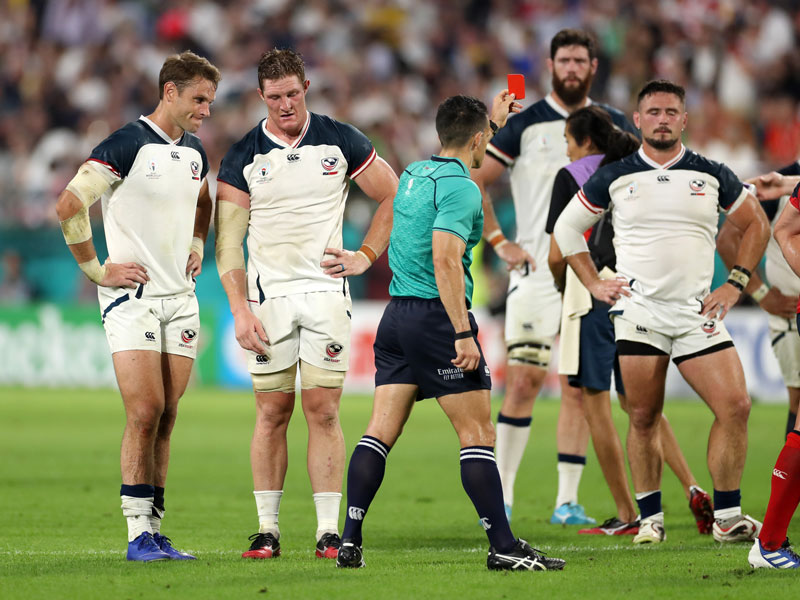Confused about the bonus-point system at Japan 2019? We break it down here
Rugby World Cup Bonus Points Explained
Bonus points were introduced to the Rugby World Cup at the 2003 tournament in Australia and ever since teams have been awarded an additional point for scoring four tries in a match and/or losing by seven points or fewer.
Teams are awarded four points for a win, two for a draw and none for a loss, with bonus points added on top of that.
For example, Namibia picked up their first-ever Rugby World Cup point in 2015 when losing 17-16 to Georgia because they were defeated by less than seven points.

Narrow defeat: Namibia on the attack against Georgia at RWC 2015 (Getty Images)
A team can pick up two points in defeat, if they score four tries and finish within seven points on the scoreline.
The maximum points a winning team can be awarded is five, with the additional point coming for scoring four or more tries.
Here is a summary of how points are awarded in the Rugby World Cup:
- Four points are awarded for a win.
- Two points are awarded for a draw.
- A try bonus point is awarded for scoring four or more tries in a match.
- A losing bonus point is awarded for losing by seven or fewer points.
At the end of the pool stages, if two teams are level on points this criteria is used in the following order to determine their final standings:
- The winner of the match between the two tied teams is ranked higher.
- The team with the best points difference in the pool stages is ranked higher.
- The team with the best difference between tries scored and tries conceded in the pool stages is ranked higher.
- The team which has scored the most points in the pool stages is ranked higher.
- The team which has scored the most tries in the pool stages is ranked higher.
- Should the teams still remain level after steps 1-5, the official World Rugby Rankings on 14 October 2019 will determine the higher ranked team.
TMO – television match official explained
What is the TMO? Rugby's television match official…
What is HIA? Rugby’s Head Injury Assessment Explained
We explain the series of checks used in…
What Happens If A Player Is Sent Off In The World Cup?
We explain all in this piece.
Bonus points are not awarded in the knockout stages. If a match is drawn in the knockout stages, the following procedure applies to determine a winner:
- Extra-time of ten minutes each way (with an interval of five minutes).
- If scores are still tied after normal extra-time, there will be ‘sudden death’. This period lasts a maximum of ten minutes and the first team to score any points will be declared the winner.
- If scores are still tied after sudden death, there will be a kicking competition. Five players who were on the field at the completion of the sudden death period will be nominated to take part in the place-kicking competition, where they have to kick from three areas on the 22m line – directly in front of the posts, on the 15m line to the left of the posts and on the 15m line to the right of the posts. A player from each team takes it in turns to kick, moving between the different positions, and the winner is the team with the most successful kicks after five attempts. If there are an equal number of successful kicks after five attempts, the competition moves into a sudden death basis until one team has more successful kicks than the other from the same number of attempts.
While bonus points have been used in domestic club competitions and major tournaments like the World Cup for many years, they were not implemented in the Six Nations until 2017.
The Top 14 runs a different bonus-point system, where teams are only awarded a try bonus point if they score three or more tries than the opposition and lose by five points or fewer. In Super Rugby, bonus points are awarded for a loss between one and seven points or scoring three or more tries than the opposition.
Follow our Rugby World Cup homepage which we update regularly with news and features.
Also make sure you know about the Groups, Warm-ups, Dates, Fixtures, Venues, TV Coverage, Qualified Teams by clicking on the highlighted links.









